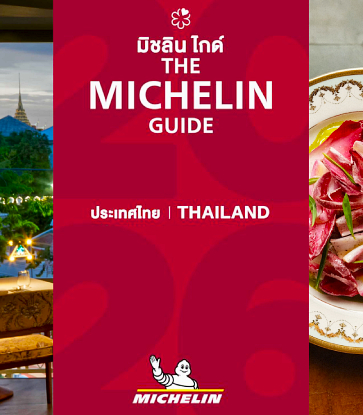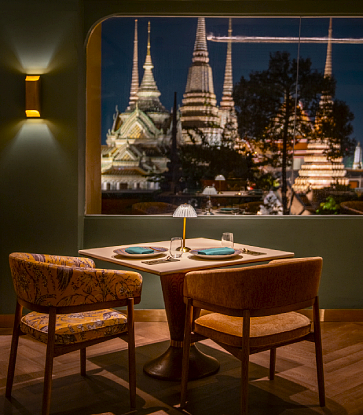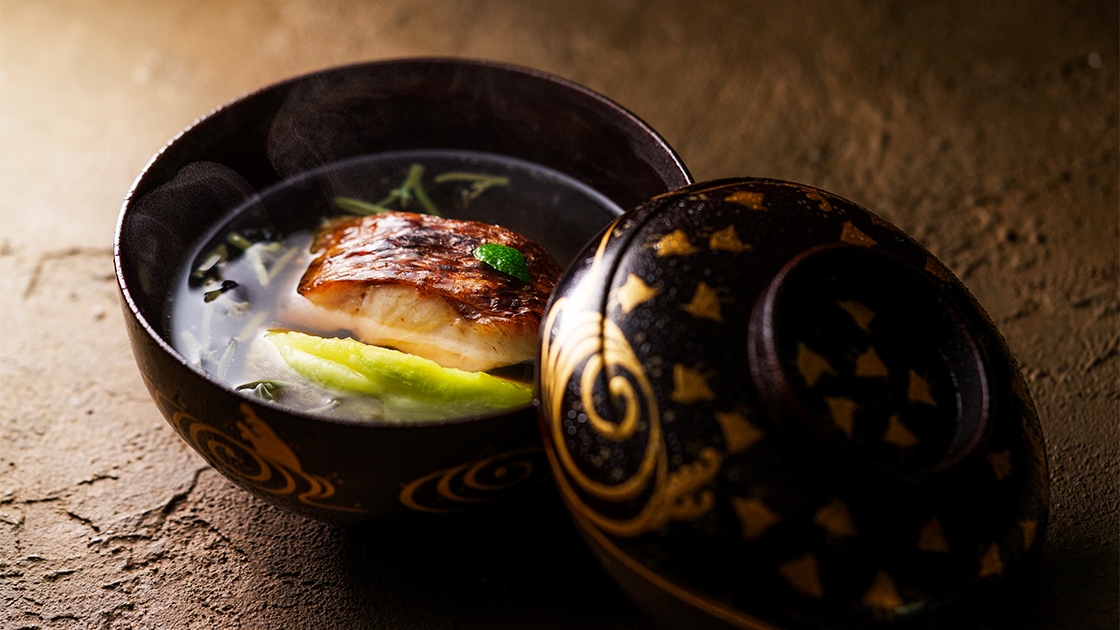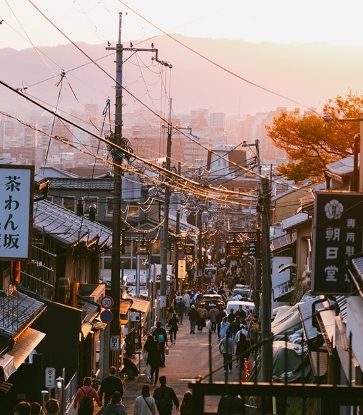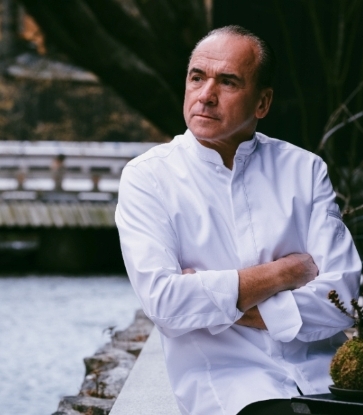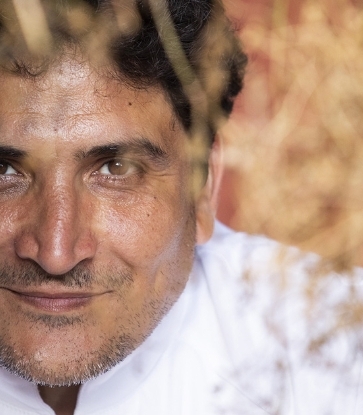In MICHELIN Guide Kyoto Osaka 2023, Eiichi Takahashi, owner-chef of Hyotei, received the first MICHELIN Kyoto/Osaka Mentor Chef Award.
The Mentor Chef Award is bestowed on chefs whose work and career are models for others to follow. The award honours chefs who devote themselves to training the next generation, serve with passion as guides for others, or contribute to the advancement of the restaurant industry as a whole.
Dedicated to passing on the traditions and culture of Japanese, and particularly Kyoto, cuisine to a new generation of culinary artists, Chef Takahashi is widely recognized as a model chef. The 14th-generation head of a family of restaurateurs, Takahashi has been a chef for over 50 years, having inherited the mantle at the tender age of 28. He has long been a driving force in the advancement of Kyoto cuisine. In this article we take a deep dive into the career arc and thoughts of this culinary leader.
On the east bank of the Kamo River that flows north-south through Kyoto stands Nanzenji Temple. Erected in the Kamakura period (1185–1333), the temple inspires awe in travellers with views of its famous gardens. Not far from Nanzenji is Hyotei, a long-serving ryotei steeped in over 450 years of history. Outside the shingle-roofed main building, the eye is immediately drawn to a banner emblazoned with a crest in the shape of a calabash. Guided by the kimono-clad hostess, we glide past mossy gardens on water-sprinkled cobblestones, banishing the clamour of the city to distant memory. Here, in a drawing room built in the style of a sukiya (tea ceremony arbour), we speak with Chef Takahashi, a man of mild, soft-spoken demeanour.

Fueki Ryuko: Fluid and Transitory, Yet Eternal and Immutable
Takahashi’s favourite motto is fueki ryuko: ‘Fluid and transitory, yet eternal and immutable.’ For Takahashi, the phrase means incorporating new elements to advance the art form while respecting its traditions and essence. It is the principle of evolving recipes and foodstuffs into a style of one’s own while respecting tradition and pursuing lifelong learning. Takahashi’s elders taught him: ‘Naturally, you want to do things that are different from the ordinary. But you mustn’t go beyond the pale either.’ Taking this advice to heart, Takahashi keeps his pivot foot within the boundaries of Hyotei while stepping beyond the bounds with the other. Tradition and innovation go hand-in-hand. With this outlook, he preserves Hyotei, a tradition handed down over many generations, while keeping a steady eye on the changing times. This is a chef at the top of his game.
Quiet Passion for Japanese Cuisine
Keen to tell the world about the special appeal of Japanese cuisine, Chef Takahashi and his friends in the culinary realm have long been enthusiastic participants in overseas events. Despite the prodigious expense involved in those days, Takahashi shipped tools foodstuffs and even water overseas by air freight from Kyoto, to offer up the taste of true Japanese cooking. The meritorious achievements of these patient efforts gained the world’s recognition, persuading UNESCO to add traditional Japanese cuisine to its Intangible Cultural Heritage list. To pass on his own knowledge and skills to the next generation, he also lent his efforts to culinary educational activities, guiding cooking schools and classrooms throughout Japan. These actions testify eloquently to Takahashi’s love and quiet passion for Japanese cuisine.
Chef Takahashi’s Message as a Guide
Chef Takahashi offers these words: “Some people in the current generation are more concerned with protecting their own territory than sharing ideas with others. Communication skills, the art of seeking advice from one’s elders and taking the next generation under one’s wing, have declined. I sense a dissolute attitude of merely absorbing from the masters and going one’s own way. But when people conduct themselves with decorum in daily life, their upbringing is evident even in outside work, such as conducting tea ceremonies at a temple. I always impress on young chefs that, if they cultivate good manners and behaviour, those habits will reflect in their cuisine.”
Some Thoughts from Yoshihiro Takahashi, the 15th-generation Chef of Hyotei
“For many people, the word ‘ryotei’ conjures images of a rarefied atmosphere,” observes Yoshihiro Takahashi, Eiichi’s successor as the ryotei’s 15th-generation chef. “But in our family, generation after generation has grown up immersed in the life of the ryotei. I want to continue the family’s tradition of a restaurant whose cuisine and service put customers at ease, the way my father has always taught and practised.” To improve technique in Japanese cuisine, Eiichi Takahashi has established a club for exchange among chefs, with himself as one of the original members. He says this practice is inspiring his son’s generation with ideas from outside the walls of the family business. With the baton passing securely from the previous generation to the next, Hyotei seems in good hands.
Yoshihiro Murata, owner-chef of the main branch of Kikunoi, a MICHELIN three-star restaurant, offers some thoughts on Eiichi Takahashi. Chef Takahashi is a father figure in the world of Kyoto cuisine, he says, who tirelessly serves the public.
Another influential figure who has worked for many years with Chef Takahashi to develop Japanese and Kyoto cuisine is Yoshihiro Murata, owner-chef of Kikunoi. Murata shares the following thoughts about Takahashi:“To us in the world of Kyoto cuisine, Chef Takahashi is like a father. He is my mentor, a man who taught me an incredible variety of things over many years. Even now, at the age of 83, he works in the kitchen, clad in chef’s whites, and presents lectures and addresses not only at cooking schools in Japan but wherever the culinary world gathers. He is truly a model chef who teaches us the importance of working for the public good. ‘Hyotei Eggs,’ a speciality of Hyotei, is worthy of passing as a trade secret from father to son, yet Chef Takahashi is committed to teaching it as the heritage of the entire nation. When the Japanese Culinary Academy was founded, Takahashi served as its first chairman, showcasing Kyoto cuisine in hopes of spurring the traditional cuisines of other regions. With his efforts focused on cultivating young chefs and his success in seeing Kyoto cuisine registered as an Intangible Cultural Property, his legacy is assured. It is no exaggeration to say that Eiichi Takahashi’s dedication as a chef raised the standard of Japanese cuisine today.”
“I’m glad I made this my life’s work.”
Asked to share his thoughts on winning the Mentor Chef Award, Chef Takahashi, with tears welling in his eyes, offered the following remarks: “I’m really happy that I was able to pursue my goal of lifelong service. Though I’ve now passed my 83rd birthday, I hope to keep wielding my kitchen knives for a long time yet. Receiving this wonderful award makes me immensely glad that I did the things I did.” These heartfelt words from Chef Takahashi, a man normally so reserved and self-possessed, clearly sprang from a flood of emotions as he looked back on the long journey of his life.Many cooks are called master chefs in this world, but few have served continuously in their kitchens as the head of a family of chefs for over half a century, training future generations in their later years. Many of today’s chefs have been touched by the influence of Eiichi Takahashi, a truly deserving recipient of our Mentor Chef Award.

Related Restaurant:
「Hyotei」
Related Pages:
MICHELIN Guide Kyoto Osaka 2023 Is Unveiled Today, With 389 Selected Restaurants





